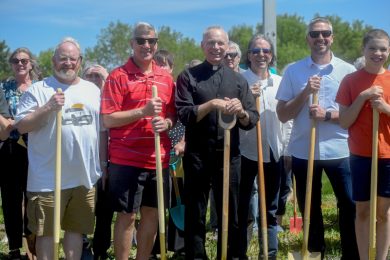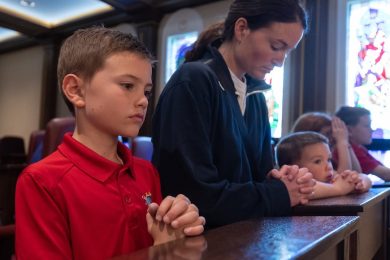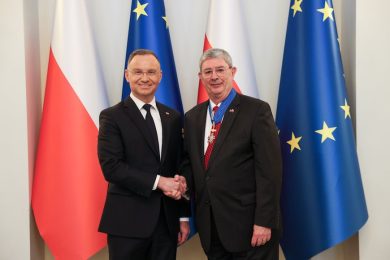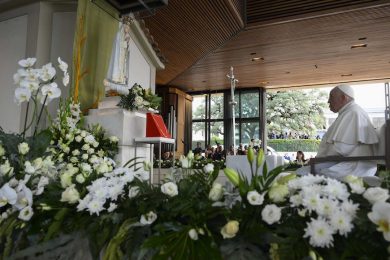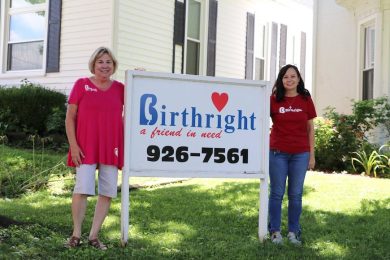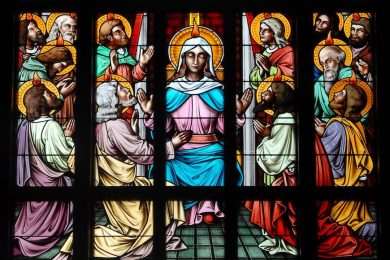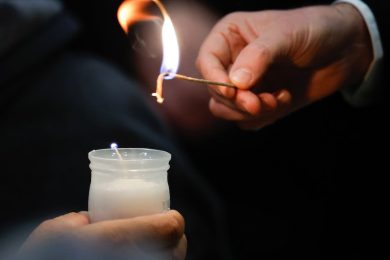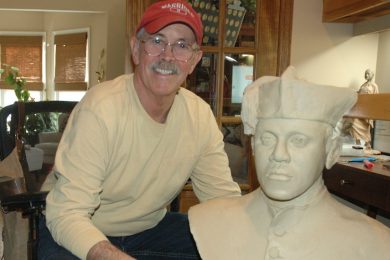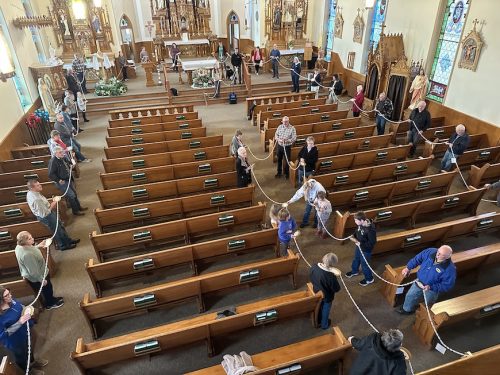The Central Minnesota Catholic randomly chose pastors from two different Area Catholic Communities — Harvest of Hope and Mary, Mother of the Church — to sit down and talk about their experiences in working through the ACC process thus far. Each of the 29 ACCs of the diocese are working in different ways and at different paces as they all strive to stay focused on the mission.
Story by Dianne Towalski
When the planning office for the Diocese of St. Cloud took a deeper look into restructuring its parishes in 2019 to best meet the current needs of the people, the concept for building Area Catholic Communities was developed and implemented. The model strives for two or more parishes to work together to serve the people of Christ in their geographical area by pooling resources — from human to natural to capital.
“The overall mission of the Catholic Church is evangelization, to share the Good News of Jesus Christ,” said Brenda Kresky, director of pastoral planning for the Diocese of St. Cloud. “Each parish accomplishes this mission differently. By sharing our resources, talents and stories with neighboring parishes we can strengthen each other’s faith and enliven the ministries in all parishes.”
The Diocese of St. Cloud has 29 ACCs across its 16-county expanse and each one has a unique identity, which continues to evolve over time, and is not without its unique challenges.
“Intentional collaboration is not easy and especially when not everyone is on board,” Kresky said. “Small successes lead to future changes and new ideas.”
The Harvest of Hope ACC and Mary, Mother of the Church ACC are two that have been working hard to implement the plan. Both have enjoyed success on several levels.
HARVEST OF HOPE ACC
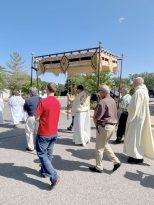
“I think the miracle here is that we are keeping Church happening,” said Benedictine Father Edward Vebelun, pastor of Harvest of Hope ACC, which includes the parishes in Albany, Avon, St. Anthony and St. Martin. “If we’re a diocese in a rural area, we have to find a way that supports rural life. It’s all about small communities and family here. I think, in the big picture, that’s what we’re doing.”
Father Vebelun said the people of the Harvest of Hope parishes were receptive to the idea of groups of parishes working together because they believed it could help ensure their parishes remained open and vibrant. But it also presented some significant challenges.
“Getting parishioners to think outside of, ‘This is how we keep our parish open,’ and to realize that this is an exciting way to work together and do greater things, has been the real challenge,” Father Vebelun said.
“To get the staffing that’s made it sustainable has also been a challenge,” he added. “And we’ve had some key people leave. I think part of that was the stress of it.”
Harvest of Hope is served by a pastor, a parochial vicar and a sacramental minister, and substitute priests from Saint John’s Abbey, all of whom are Benedictine priests, Father Vebelun said. The ACC also currently has two permanent deacons and one transitional deacon.
Key lay leaders include an ACC pastoral associate, liturgy director and a business manager to offer professional assistance and consultation. Each parish continues to operate with a certain level of autonomy and has their own paid or volunteer administrative assistant, faith formation coordinator and music/liturgy director.
In addition to the parishes, the ACC includes Holy Family School in Albany, which is independently staffed with a principal, teachers and support staff. Mother of Mercy, a senior care campus within the ACC, benefits from a spiritual life team that includes a deacon coordinator and the three priests offering sacramental and pastoral ministry.
One of the first things the ACC did to build excitement and unity was to have contests to name the ACC and design a logo. Everyone was asked to vote during Mass at all the parishes.
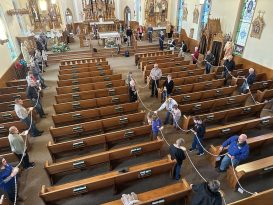
“Everybody got buy-in and we had nearly a hundred entries for names,” Father Vebelun said.
Since then, the four parishes have collaborated on a number of events and programs, like organizing an ACC picnic, helping each other with parish festivals, and sponsoring an ACC-wide Corpus Christi procession and living rosary that travels from parish to parish.
Father Vebelun said he thinks one of the advantages that Harvest of Hope has is that all four of the parishes are in the Albany Area School District, so the families already know each other.
“If you look up Albany Area School District on the Internet, you’ll see they claim the towns of Albany, Avon, St. Anthony, St. Martin and Farming. And that’s what we are,” he said. “That has really helped us here because people [already] had some basic relationships.”
And those connections have been key to the success of the community.
“My big emphasis is that this is about building relationships,” Father Vebelun said. “Don’t just think of structures first; think about how we build relationships first. And we have done that well.
“We’ve reached stability,” he added. “Now it’s about how we evangelize.”
MARY, MOTHER OF THE CHURCH ACC
Mary, Mother of the Church Area Catholic Community is the largest ACC in the diocese with eight parishes in Wadena, Verndale, Staples, Motley, Menahga, Bluffton, Bluegrass and Bertha. Bringing them together has taken a lot of hard work, according to Father Aaron Kuhn, pastor of the ACC.
“I’m very proud of all of our staff and our parishioners and the work that they’ve done helping to accomplish what we’re doing, because this isn’t one person’s vision, this is a shared trust in the implementation of change,” Father Kuhn said.
The process hasn’t been without complications, but taking a synodal approach of listening and communicating has been a key part of the ACC’s success. When problems, or “growing pains,” as Father Kuhn calls them, came up, they scheduled town hall meetings or listening sessions.
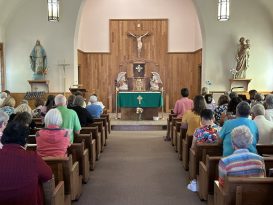
“We had to listen to what [our parishioners] were saying, but then we also had to explain what the process is, why we’re doing this,” Father Kuhn said.
Twice a year, the ACC leadership holds a “State of the ACC” address that is open to everyone. It gives the senior staff and Father Kuhn the opportunity to update parishioners on what’s been accomplished, what the staff is currently working on and their vision for the next six months.
One of the original expectations of every Area Catholic Community was to determine the best approach for good stewardship of facilities, finances, staff and programs to meet the community’s pastoral and spiritual needs.
With the eight parishes working out of five offices, consolidating the staff was a must, Father Kuhn said.
“We chose to go down to two offices based on our needs,” he said. “Staffing was adjusted around that. And then with consolidation of job positions, we were able to hire more full-time positions as a result.”
Faith formation is united under five discipleship directors who work together as a team with a full-time discipleship director who guides them. All administrative positions across the two offices are under the guidance of one business administrator. One liturgy director works with all of the musicians across the eight parishes.
“Those three full-time positions have really helped to unite the parishes on an administrative level. So that’s a unique thing that we’ve chosen to do,” Father Kuhn said. “That’s been very helpful.”
Mary, Mother of the Church has an ACC pastoral council. Each of the parishes has a finance council as required by Church law. The former parish councils have become “parish life committees” that meet together quarterly to talk about initiatives that the ACC is working on.
“One of their tasks is that once a year, they have to either physically meet each parishioner or call every parishioner and be in contact with them,” Father Kuhn said.
“I think one blessing that we’ve seen is that we’ve gotten a lot accomplished. We are just buzzing with new activities all the time around here,” said Deacon Randy Altstadt, the ACC’s business administrator.
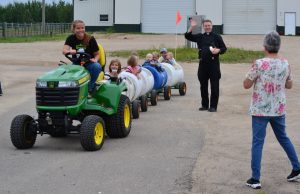
Father Kuhn said youth involvement is a great example of what’s working. Youth representatives from all eight parishes participate in youth events and trips including the Steubenville conference and National Catholic Youth Conference. Once or twice a month, parochial vicar Father Gabriel Walz holds an event called “Fires with Father” where youth are invited to gather around a campfire and ask him questions.
It might seem like a difficult challenge to bring youth together from across seven different school districts, but that’s not the case, Father Kuhn said.
“They go to each other’s games, they go to each other’s sporting events, and they just don’t see the parish boundaries as being something inhibitive for them,” he said. “They want to hang out, and they have friends that are across the ACC. So anywhere between 40 and sometimes it feels like 100 kids are coming together for various events. It’s really, really beautiful.”
One area of tension Father Kuhn noted is the generation gap between those who are invested in the physical maintenance of the parishes who want to preserve what was given to them by their parents and grandparents and the younger generation who does not seem to experience a need to maintain small parish identity.
“They are significantly more interested in a Church that is universally available to them, to what their needs are, and so they don’t find a need to maintain structures or old habits,” he said.
That’s a tension that is proving hard to overcome.
“I kind of look at [the ACC] like a family,” Deacon Altstadt said. “Each parish is like a child, and you want to give them all the same amount of attention, or at least the attention they deserve or want, but I don’t think we can always do that as an ACC.”
Father Kuhn said that pastors need to know that their parishioners support them and when tough decisions come up, they should address them like a healthy family.
“If we’re a family who’s making tough decisions for the sake of the future,” Father Kuhn said, “then we can move through the pain, we can grieve together, we can pray together, we can maintain the focus on the mission that we share together.”



